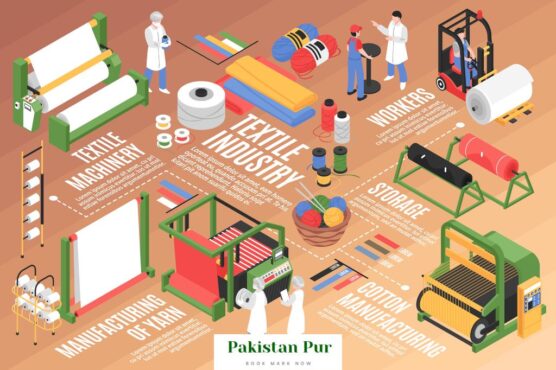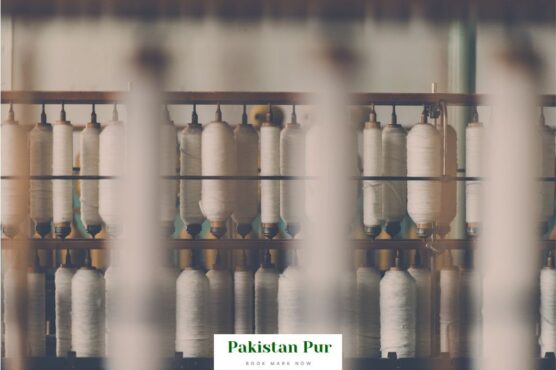
Table of Contents
Textile engineering combines scientific principles, innovation, and technical expertise to design and manufacture textiles for various applications.
In the BS Textile Engineering in Pakistan, students learn a combination of basic sciences (physics, mathematics), specialized textile engineering courses, and practical skills related to textile design, production, and technology. The curriculum focuses on developing a solid foundation in both theoretical knowledge and practical application within the textile industry.
A career in textile engineering offers diverse opportunities in textile design, quality control, production management, and research and development. These programs aim to contribute to the growth of Pakistan’s textile and clothing industry on a global scale.
Let’s explore the universities that offer BS Textile Engineering in Pakistan, BS textile engineering scope in Pakistan, eligibility criteria, and fee structure.
This Guide to BS Textile Engineering in Pakistan is a part of the series on the best degrees after FSc Pre Engineering. Read the full list of best degrees and best fields after FSc Pre Engineering here.
Best Fields after FSc Pre Engineering in Pakistan

Universities Offering BS Textile Engineering in Pakistan
These institutes, colleges, and universities offer BS textile engineering. Use the search function to find a university or all the universities in your city.
| Institution | City | Program | Public/Private |
|---|---|---|---|
| National Textile University | Faisalabad | BS , 4 Years | Public |
| Mehran University Of Engineering & Technology | Jamshoro | BE , 4 Years | Public |
| NED University Of Engineering & Technology | Karachi | BE , 4 Years | Public |
| Bahauddin Zakariya University, Multan | Multan | B.Sc. , 4 Years | Public |
| Balochistan University Of IT & Management Sciences | Quetta | BS , 4 Years | Public |
| Hamdard University Faisalabad Campus | Faisalabad | BE , 4 Years | Private |
| University Of Engineering And Technology Faisalabad Campus | Faisalabad | B.Sc., 4 Years | Public |
| National Textile University Faisalabad, Sub Campus | Karachi | BS , 4 Years | Public |
| Synthetic Fibre Development & Application Centre | Karachi | BE , 4 Years | Public |
| University Of Agriculture | Faisalabad | B.Sc., 4 Years | Public |
| National Textile University Faisalabad, Sub Campus | Karachi | BS , 4 Years | Public |
| SMA Rizvi Textile Institute | Karachi | BS , 4 Years | Private |
BS Textile Engineering Scope in Pakistan
The scope of BS Textile Engineering in Pakistan is promising, offering a range of career opportunities in the textile industry. Graduates can pursue careers as process improvement engineers, technical textile machinery engineers, computer-based textile designers, quality control officers, and operations trainees.
Let’s discuss careers, salary, and further education after BS textile engineering in Pakistan.
Industries for BS Textile Engineering Graduates
Textile engineering graduates possess a diverse skill set that opens up opportunities in various industries. With their expertise in textile design, production, and technology, they can find employment in:
- Textile Manufacturing: Graduates can work in textile mills, factories, and manufacturing units involved in the production of yarn, fabric, clothing, and other textile products.
- Apparel and Fashion Industry: They can contribute to the design and development of innovative textiles, fabrics, and garments for renowned fashion brands and retailers.
- Technical Textiles: The field of technical textiles offers prospects in industries such as automotive, aerospace, healthcare, and sports, where specialized fabrics are used for applications like airbags, medical textiles, protective clothing, and geotextiles.
- Research and Development: Graduates can engage in research and development activities to explore new textile materials, technologies, and sustainable practices, contributing to advancements in the industry.
- Quality Control and Testing Labs: They can work in laboratories focusing on quality control, testing, and analysis of textiles to ensure compliance with industry standards and specifications.
- Supply Chain Management in Textile Industry: With their understanding of the textile production processes, graduates can contribute to the efficient management of the supply chain, ensuring timely delivery and cost optimization.
- Technical Sales and Marketing: They can pursue careers in technical sales, marketing, and consultancy, promoting textile products, machinery, and technologies to various stakeholders in the industry.
Careers for BS Textile Engineering Graduates
The field of textile engineering offers a wide range of career options for graduates. With their knowledge in textiles, materials, and production processes, they can excel in various industries.
Here are some potential careers for BS Textile Engineering graduates:
- Textile Production Engineer: Overseeing the manufacturing process, ensuring efficiency, quality, and cost-effectiveness.
- Technical Sales Representative: Promoting and selling textile products, machinery, and technologies to clients.
- Textile Research and Development Engineer: Conducting research to innovate new textile materials, technologies, and sustainable practices.
- Quality Control Officer: Ensuring that textile products meet industry standards and specifications in terms of quality.
- Apparel Designer: Creating and designing clothing, considering aesthetics, functionality, and market trends.
- Textile Technologist: Evaluating and testing textile materials for performance, durability, and safety.
- Textile Process Improvement Engineer: Identifying and implementing strategies to enhance production efficiency and reduce costs.
- Technical Consultant: Providing expertise and advice on textile engineering-related matters to businesses and organizations.
These are just a few examples, and there are many other career paths available. The textile industry offers opportunities in areas such as fashion, technical textiles, research, manufacturing, and quality control. Graduates can work in textile mills, fashion brands, research institutions, and consulting firms.
BS Textile Engineering Salary in Pakistan
The starting salary for fresh graduates of BS Textile Engineering in Pakistan can vary depending on factors such as location, experience, and the specific job role.
Here is an overview of the average starting salaries for BS Textile Engineering fresh graduates in Pakistan:
- The average yearly salary for a Textile Designer in Pakistan is Rs 594,952 in 2023. (Source: PayScale)
Further Education after BS Textile Engineering in Pakistan
If you’re considering furthering your education after completing a BS in Textile Engineering in Pakistan, there are several options available to expand your knowledge and advance your career. Here are some potential paths you can explore:
- Master’s Degree in Textile Engineering: Pursuing a master’s degree in Textile Engineering will provide you with in-depth knowledge and specialization in specific areas of the field. This advanced degree can open doors to higher-level positions and research opportunities.
- MBA in Textile Management: Combining your technical expertise with business acumen can be a valuable asset in the textile industry. An MBA with a focus on Textile Management will equip you with skills in operations, marketing, finance, and strategic planning.
- Advanced Diploma in Fashion Design: If you have an inclination towards the creative side of textiles, pursuing an advanced diploma in fashion design can help you become a skilled designer. This program will enhance your artistic abilities and provide insights into fashion trends and garment production.
- Postgraduate Diploma in Textile Quality Control: Specializing in textile quality control can lead to rewarding careers in ensuring product quality and compliance with standards. A postgraduate diploma in this field will equip you with the necessary skills and knowledge to excel in this aspect of the industry.
- Ph.D. in Textile Engineering or related fields: If you have a passion for research and academia, pursuing a Ph.D. in Textile Engineering or a related field can open up opportunities in teaching, researching, and developing innovative textile technologies.
Remember to thoroughly research each option and consider how it aligns with your career goals and interests. Additionally, scholarships and funding opportunities may be available, so explore those avenues to support your further education journey.

BS Textile Engineering Syllabus and Subjects
The syllabus and subjects covered in the BS Textile Engineering program in Pakistan may vary slightly depending on the university or institution. However, I found major subjects in bs textile engineering that are typically part of the curriculum.
Here is an overview:
- Textile Chemistry
- Engineering Mechanics
- Functional English
- Linear Algebra
- Communication and Presentation Skills
- Information and Communication Technologies (ICT)
- Textile Engineering Principles
- Textile Manufacturing Processes
- Fiber Science and Technology
- Yarn Manufacturing Technology
- Fabric Manufacturing Technology
- Textile Testing and Quality Control
- Fashion Design and Product Development
- Textile Management and Marketing
- Textile Machinery and Equipment
These subjects aim to provide students with foundational knowledge and skills in textile engineering, including understanding textile materials, manufacturing processes, quality control, product development, and management aspects.
HEC Curriculum of BS Textile Engineering
This is the curriculum for BS textile engineering in Pakistan. The syllabus was developed by HEC and PEC. You can also read the full document for BS Textile Engineering Curriculum in Pakistan here.
BS Textile Enigineering Semester 1:
- Introduction to Textile Engineering:
- Functional English:
- Information and Communication Technologies (ICT):
- Calculus and Analytical Geometry:
- Applied Chemistry:
- Pakistan Studies and Global Perspective:
- Applied Physics:
- Islamic Studies:
- Occupational Health and Safety: 1 credit
- Thermodynamics and Fluid Mechanics:
BS Textile Enigineering Semester 2:
- Textile Raw Materials:
- Linear Algebra:
- Communication Skills:
- Engineering Drawing: 1 credit
- Communication Skills:
- Thermodynamics and Fluid Mechanics:
Second Year: BS Textile Enigineering Semester 3:
- Yarn Manufacturing Fundamentals:
- Textile Chemical Processing Fundamentals:
- Fabric Manufacturing Fundamentals:
- Garment Manufacturing Fundamentals:
- Mechanical Engineering Fundamentals:
- Electrical & Electronics Eng. Fundamentals:
- Computer Programming (C Language):
- Manufactured and High-Performance Fibers:
- Fiber Science:
- Social Science Elective-II (Engineering Economics):
BS Textile Enigineering Semester 4:
- Engineering Elective-I:
- Colour Science:
- Instrumentation & Control:
- Management Science Elective-I:
- Textile Industry Utilities & Services:
- Technical Textiles Fundamentals:
- Technical Writing and Presentation Skills:
- Probability and Statistics:
- Differential Equations:
Third Year: BS Textile Engineering Semester 5:
- Engineering Elective-II:
- Social Science Elective-I:
- Instrumentation & Control:
- Management Science Elective-I:
- Textile Industry Utilities & Services:
- Technical Textiles Fundamentals:
- Technical Writing and Presentation Skills:
- Probability and Statistics:
- Differential Equations:
BS Textile Engineering Semester 6:
- Engineering Elective-II:
- Colour Science:
- Instrumentation & Control:
- Management Science Elective-I:
- Textile Industry Utilities & Services:
- Technical Textiles Fundamentals:
- Technical Writing and Presentation Skills:
- Probability and Statistics:
- Differential Equations:
Fourth Year: BS Textile Semester 7:
- Engineering Elective-III:
- Engineering Elective-IV:
- Textile Testing and Quality Control:
- Environment, Health and Safety:
- Denim Manufacturing and Processing:
- Management Science Elective-II:
- FYDP-II:
- FYDP-I:
BS Textile Engineering Semester 8:
- Engineering Elective-V:
- Engineering Elective-VI:
- Recent Trends in Textiles:
- Environment, Health and Safety:
- Denim Manufacturing and Processing:
- Management Science Elective-II:
BS Textile Engineering Eligibility Criteria for Admission
To gain admission into a BS Textile Engineering program in Pakistan, you need to meet certain eligibility criteria set by the universities.
Here is an overview of the common requirements:
- Academic Qualifications: You must have completed your intermediate education (FSc/ICS/DAE/BSc) or an equivalent foreign qualification with a minimum of 50% marks. The required subjects usually include Physics, Mathematics, and Chemistry/Computer Science.
- Specific Subject Requirements: Some universities may have additional subject requirements, such as Mathematics and Physics, which are commonly required for admission into the BS Textile Engineering program.
- Entrance Tests: Some universities may require you to take entrance tests, such as the GAT test (Graduate Assessment Test) or NAT-IE test (National Aptitude Test-Engineering), as part of the admission process. These tests assess your aptitude and academic readiness for the program.
It’s important to note that eligibility criteria may vary slightly among different universities offering the BS Textile Engineering program.
It is recommended to refer to the official websites or contact the admissions departments of the respective institutions for the most accurate and up-to-date information regarding eligibility requirements.
BS Textile Engineering Universities in Different Cities
BS Textile Engineering in Lahore
Currently, no university is offering BS textile engineering in Lahore. However, these two universities offer BSc Textile Engineering Technology.
The difference between textile engineering and textile engineering technology is that textile engineering technology is more focused on the practical aspect and the course prepares students to start working in the field immediately whereas, the BS textile engineering is more focused on theory and gives a high level understanding of textile engineering.
Looking at it from an employment perspective, BSc Textile engineering technology graduates are more likely to be hired due to their practical skills.
- Punjab Tianjin University of Technology (PTUT) Lahore
- University of Engineering and Technology UET Lahore
BS Textile Engineering in Karachi
These universities offer BS Textile Engineering in Karachi.
- NED University Of Engineering & Technology
- National Textile University Faisalabad, Sub Campus
- Synthetic Fibre Development & Application Centre
- National Textile University Faisalabad, Sub Campus
- SMA Rizvi Textile Institute
BS Textile Engineering in Faisalabad
These universities offer BS Textile Engineering in Faisalabad.
- National Textile University
- Hamdard University Faisalabad Campus
- University Of Engineering And Technology Faisalabad Campus
- University Of Agriculture

FAQs
What is textile engineering?
Textile engineering is a branch of engineering that focuses on the design, production, and application of textiles. It encompasses various aspects such as fabric manufacturing, fiber science, yarn production, and textile chemical processing. Textile engineers develop innovative materials and technologies for industries like fashion, apparel, automotive, and medical textiles.
What is the work of textile engineer?
Textile engineers fulfill a critical role in the textile industry. They utilize their expertise in fabric manufacturing, fiber science, and technical know-how to design and develop innovative materials. Their responsibilities include research, data analysis, process improvement, quality control, and staying up-to-date with advancements in textile technology. They play a vital role in shaping the future of textiles through their knowledge and expertise.
Leave a Reply